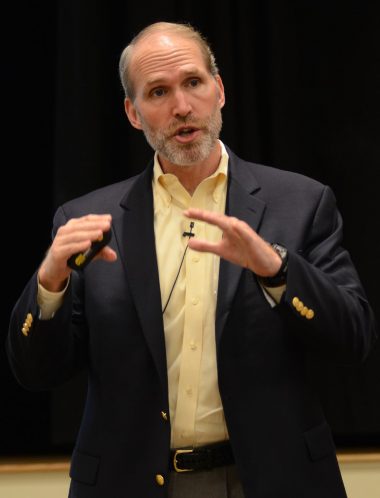Dozens of students, educators, residents and people who work in water management across the state attended the daylong conference.
A discussion about the environmental impacts of fracking, the highly debated method of extracting gas from shale deposits using horizontal drilling and hydraulic fracturing, opened the 10th annual Elon University Fall Environmental Forum on Sept. 30.

“This is an issue that people feel passionately about because they care about the environment” and what’s going on around them, said Robert Jackson, a biology professor and the Nicholas Chair of Global Environmental Change at the Nicholas School of the Environment at Duke University, who served as the event’s keynote speaker.
Dozens of students, educators, residents and people who work in water management across the state attended the daylong conference sponsored by the Elon University Center for Environmental Studies and Elon’s Office of Sustainability.
As part of his speech, Jackson shared the findings of a recent study he and other Duke colleagues conducted into the effects of fracking on well water in northeastern Pennsylvania, where the technique is widely being used. While the scientists did not find any traces of fracking fluids – chemicals used during the gas extraction process – in their samples, they did find unsafe levels of methane in water from wells located one kilometer or less from a fracking site.
Additional analyses suggested the methane was produced in the deep shale and leaked to the ground.
Jackson said researchers are yet to look into the health risks associated with the high-presence of methane in well water, something he hopes happens soon. He suggested states like North Carolina, which are considering this type of gas extraction, put public health and environment safeguards in place before drilling even starts.
“If you build a well poorly, you’re going to have problems,” Jackson said. “There is too much pressure to do it in a hurry, to move the equipment to the next site. It’s like the BP Oil Spill. Why did it happen? Because people were not careful. I believe that’s what is happening here.”
North Carolina Rep. Alice Bordsen, who represents Alamance County, moderated the event. She said the forum could not have come at a better time, adding that most members of the legislature do not have a scientific background and yet have to make “heavy decisions” on issues such as fracking, a topic they will be discussing in the coming months.
Bordsen encouraged attendees to contact their representatives to educate them about fracking and its potential effects on the environment.
The conference also featured sessions and discussions on community involvement in water stewardship and conservation in North Carolina. Associate professor Janet McFall, director of the Elon Center for Environmental Studies, said the goal of the forum is to inform students and people in the community about issues affecting our water resources and allow them to be part of the conversation.
“In North Carolina, water belongs to the public,” McFall said. “The state’s role is to help regulate it so that no one gets hurt and no one benefits unequally from it.” But in the end, she added, “it’s our water. Let’s talk about it.”


